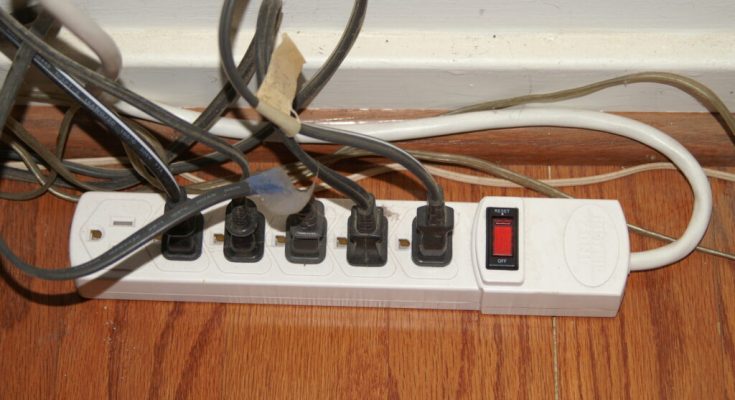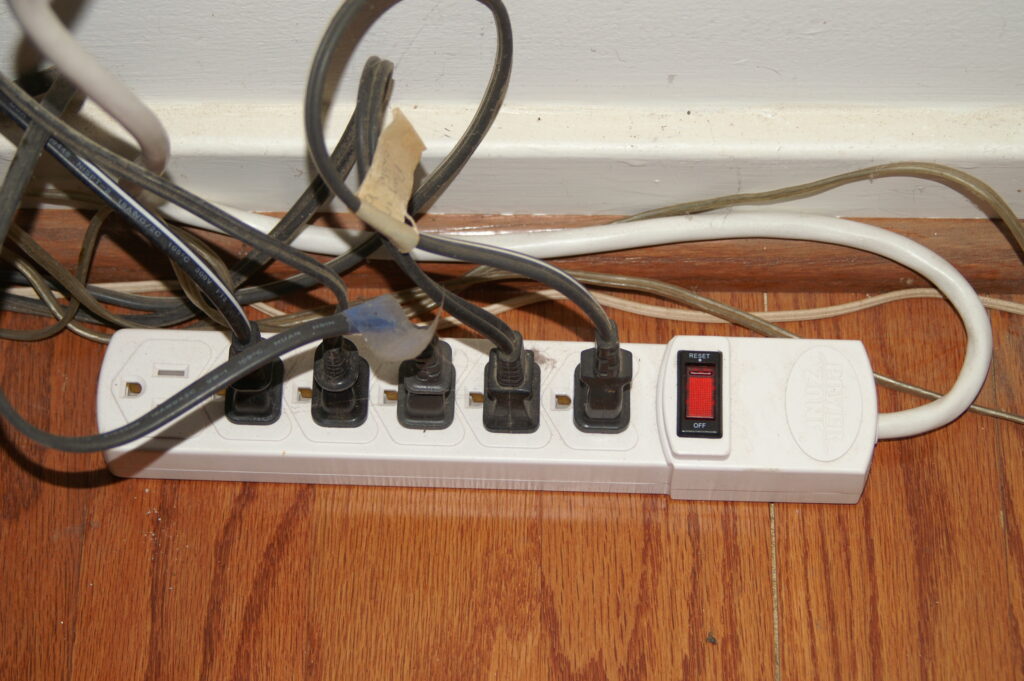Power strips are a common solution for situations where the number of plugs in a standard wall socket is insufficient to power all of our electrical appliances and electronics.
Although these devices can charge smartphones or power an entertainment system, there are some that consume too much power and should never be plugged into a power strip.
Overheating power strips pose a fire risk when used with high-wattage appliances like toasters, space heaters, and air conditioners.
Additionally, you shouldn’t utilize an indoor power strip in a damp environment, such a kitchen or laundry room, because of the potential for damage.
Be sure that the devices you plug into a power strip do not exceed its maximum wattage, which can be found on the device’s label.
This rule applies wherever you may be using a power strip.
The majority of power strips have a 15 amp rating, meaning they can manage 1,800 watts.
If you require more power than that, look for a 20-amp power strip that can manage loads of up to 2,400 watts.
1. Refrigerators
A power strip can quickly become overloaded by power-hungry, often-cycled appliances like refrigerators. It is recommended to connect these gadgets to an electrical outlet that is specifically designed to power them. You run the danger of shorting out the circuit if you attempt to use the same outlet for more than one gadget.
2. Microwaves
The microwave is a culinary marvel because it cooks, thaws, and reheats food much faster than a regular oven. However, a power strip cannot supply enough energy for all that fantastic activity. A separate electrical outlet is required for the microwave, just as there would be for a standard electric oven.
3. Coffee Makers
In order to transform those roasted beans into a hot beverage, most coffee makers require a significant amount of amperage, which may seem like a lot of energy for something as seemingly innocuous as your morning cup of coffee. If you don’t want to wake up to a partially brewed pot of coffee, make sure you plug your coffee maker straight into an outlet.
4. Kitchen range hoods
The inside of a toaster consists essentially of a network of wires that are heated to extremely high temperatures in order to toast the bread. Anyone who has ever looked inside to remove a stubborn bit of crust knows this. A power strip can rapidly overheat due to the current draw of such wires. Electric skillets, toaster ovens, and waffle makers all have the same problem.
5. Slow Cookers
When you connect your slow cooker to a power strip so you can move other appliances off your countertop, you might think you’re a genius, but you’d be mistaken. These kitchen gadgets use more power for a longer length of time than a standard power strip can provide. Also, ensure sure the slow cooker is securely connected to a wall outlet to avoid any potential dangers, because its main selling point is its ability to cook food slowly and without human intervention.
6. Hair-Care Appliances
The electricity required to run your flat irons, curling wands, and hair dryers is substantial. For safety reasons, never connect a hairstyle tool that uses heat directly into an electrical outlet. If possible, use a GFCI outlet to eliminate the risk of water damage, which is a typical problem in bathrooms. This will keep the circuit breaker from tripping.
Read After: 4 Tips To Remove Grease From Kitchen Cabinets That Will Save You A Lot Of Money
7. Air Conditioners
The design of portable air conditioners is similar to that of heaters; when turned on, they draw a significant amount of current. Doing so poses the risk of overheating or tripping the circuit breaker on a power strip. This is why these devices require a specific outlet for operation at all times.
8. Sump Pumps
In cases of basement flooding, a sump pump is frequently the final line of defense to keep the area dry. You can’t use a power strip with a sump pump because they weren’t made to handle moisture. Alternatively, in the event that your basement experiences flooding, it is recommended to connect a sump pump to a GFCI outlet, ideally situated a few feet above ground.
9. Air Compressors
Though they consume a lot of power when turned on, portable air compressors are useful tools for do-it-yourselfers who aren’t afraid to get their hands dirty. To get the most out of your air tools, use a sturdy extension cable instead of putting too much strain on a power strip.
10. Another Power Strip
It is not recommended to utilize two power strips simultaneously. Actually, most fire safety rules forbid “daisy-chaining,” the practice of connecting numerous power strips in series, and it can cause your electrical system to rapidly overload. Similarly, you shouldn’t utilize extension cords in conjunction with power strips. Cutting the cord and finding power-free alternatives to your household gadgets are two options if you run out of outlets. Another is to disconnect one item before plugging in another.
11. Juicers
No appliance, no matter how little, can be safely plugged into a power strip. Ninja and Vitamix blenders, among many others, have powerful motors that can chop down tougher foods. Therefore, they are comparable in wattage consumption to space heaters, toasters, and air conditioners, as they can consume up to 1500 watts. Since a blender’s main function is to liquefy food, there’s also the risk of the power strip becoming wet and shorting out the appliance. Be sure to use a kitchen GFCI outlet whenever you plug in a blender.
12. Washing Machine
The maximum power consumption of most washing machines is 1400 watts, which is extremely near to the maximum load capacity of most power strips. Overheating a power strip is a common problem with washing machines since people often leave them unattended while they wash clothing. Some cycles can take up to an hour to finish. Do not use a power strip; instead, connect the washing machine straight to the wall socket.
13. Portable Heaters
When set on high, most portable heaters consume 1,500 watts of power and can operate for long periods of time when connected to power strips, making them particularly hazardous. Even while most portable heaters have built-in safety features that turn them off when they get too hot, that won’t stop the power strip from getting too hot and perhaps catching fire.
14. Power Tools
A power strip is a safe way to run power tools in the workshop, but just any old strip won’t cut it. A 220 volt power strip with grounded outlets is all you need. Also, the wire connecting the strip to the plug should be thicker, 14-gauge wire so that the power strip doesn’t overheat under heavy loads. When working with electric instruments like table saws, circular saws, and chop saws, it is crucial to use a correct power strip with a greater wattage rating.
15. Gaming Equipment
It is acceptable to utilize a power strip for your gaming system, but you should be careful not to plug in too many components at once. Although the power consumption of your gaming PC is likely to be around 500 watts, you should also consider plugging in a monitor, speakers, lights, and any other necessary accessories. Check the wattage rating of the power strip and the stickers on each device to determine how much current you will be drawing. If you care about keeping these delicate electronics safe from power spikes, a multi-use power strip is the way to go.
Now Trending: Drop 3 Ice Cubes Into The Washing Machine: You Can’t Imagine What Happens To Your Laundry
Please SHARE this article with Family and Friends!




